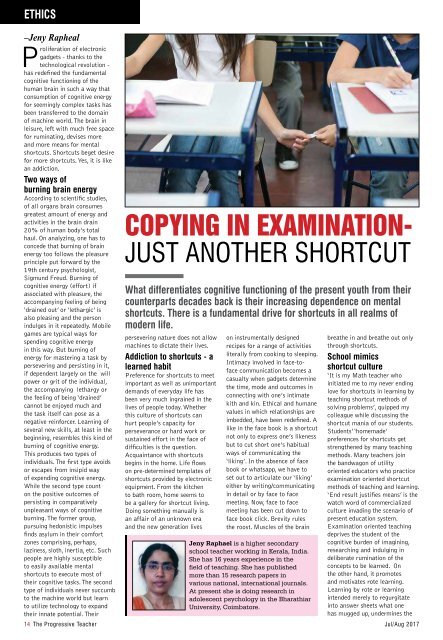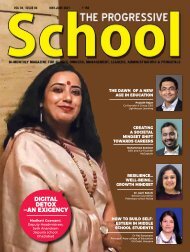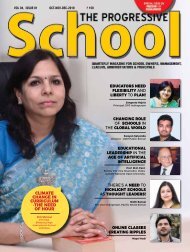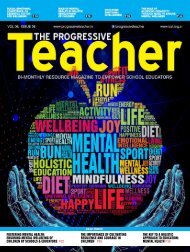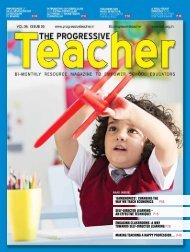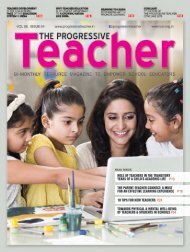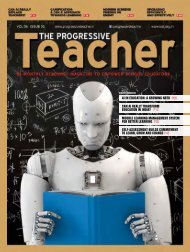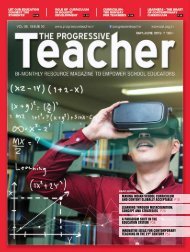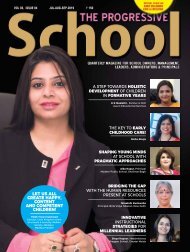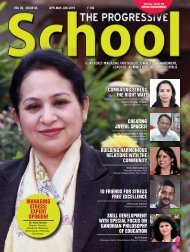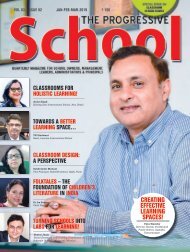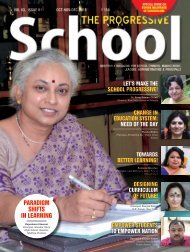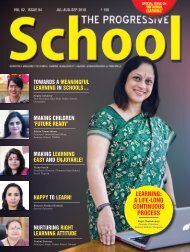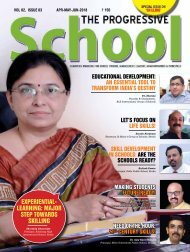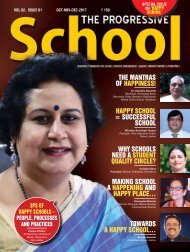The Progressive Teacher Vol 04 Issue 03
This issue of The Progressive Teacher focuses on "New Trends in Education ". In this edition, articles explore contemporary trends to enhance interactive learning amongst students.
This issue of The Progressive Teacher focuses on "New Trends in Education ". In this edition, articles explore contemporary trends to enhance interactive learning amongst students.
You also want an ePaper? Increase the reach of your titles
YUMPU automatically turns print PDFs into web optimized ePapers that Google loves.
ethics<br />
–Jeny Rapheal<br />
Proliferation of electronic<br />
gadgets - thanks to the<br />
technological revolution -<br />
has redefined the fundamental<br />
cognitive functioning of the<br />
human brain in such a way that<br />
consumption of cognitive energy<br />
for seemingly complex tasks has<br />
been transferred to the domain<br />
of machine world. <strong>The</strong> brain in<br />
leisure, left with much free space<br />
for ruminating, devises more<br />
and more means for mental<br />
shortcuts. Shortcuts beget desire<br />
for more shortcuts. Yes, it is like<br />
an addiction.<br />
Two ways of<br />
burning brain energy<br />
According to scientific studies,<br />
of all organs brain consumes<br />
greatest amount of energy and<br />
activities in the brain drain<br />
20% of human body’s total<br />
haul. On analyzing, one has to<br />
concede that burning of brain<br />
energy too follows the pleasure<br />
principle put forward by the<br />
19th century psychologist,<br />
Sigmund Freud. Burning of<br />
cognitive energy (effort) if<br />
associated with pleasure, the<br />
accompanying feeling of being<br />
‘drained out’ or ‘lethargic’ is<br />
also pleasing and the person<br />
indulges in it repeatedly. Mobile<br />
games are typical ways for<br />
spending cognitive energy<br />
in this way. But burning of<br />
energy for mastering a task by<br />
persevering and persisting in it,<br />
if dependent largely on the will<br />
power or grit of the individual,<br />
the accompanying lethargy or<br />
the feeling of being ‘drained’<br />
cannot be enjoyed much and<br />
the task itself can pose as a<br />
negative reinforcer. Learning of<br />
several new skills, at least in the<br />
beginning, resembles this kind of<br />
burning of cognitive energy.<br />
This produces two types of<br />
individuals. <strong>The</strong> first type avoids<br />
or escapes from insipid way<br />
of expending cognitive energy.<br />
While the second type count<br />
on the positive outcomes of<br />
persisting in comparatively<br />
unpleasant ways of cognitive<br />
burning. <strong>The</strong> former group,<br />
pursuing hedonistic impulses<br />
finds asylum in their comfort<br />
zones comprising, perhaps,<br />
laziness, sloth, inertia, etc. Such<br />
people are highly susceptible<br />
to easily available mental<br />
shortcuts to execute most of<br />
their cognitive tasks. <strong>The</strong> second<br />
type of individuals never succumb<br />
to the machine world but learn<br />
to utilize technology to expand<br />
their innate potential. <strong>The</strong>ir<br />
COPYING IN EXAMINATION-<br />
JUST ANOTHER SHORTCUT<br />
What differentiates cognitive functioning of the present youth from their<br />
counterparts decades back is their increasing dependence on mental<br />
shortcuts. <strong>The</strong>re is a fundamental drive for shortcuts in all realms of<br />
modern life.<br />
persevering nature does not allow<br />
machines to dictate their lives.<br />
Addiction to shortcuts - a<br />
learned habit<br />
Preference for shortcuts to meet<br />
important as well as unimportant<br />
demands of everyday life has<br />
been very much ingrained in the<br />
lives of people today. Whether<br />
this culture of shortcuts can<br />
hurt people’s capacity for<br />
perseverance or hard work or<br />
sustained effort in the face of<br />
difficulties is the question.<br />
Acquaintance with shortcuts<br />
begins in the home. Life flows<br />
on pre-determined templates of<br />
shortcuts provided by electronic<br />
equipment. From the kitchen<br />
to bath room, home seems to<br />
be a gallery for shortcut living.<br />
Doing something manually is<br />
an affair of an unknown era<br />
and the new generation lives<br />
on instrumentally designed<br />
recipes for a range of activities<br />
literally from cooking to sleeping.<br />
Intimacy involved in face-toface<br />
communication becomes a<br />
casualty when gadgets determine<br />
the time, mode and outcomes in<br />
connecting with one’s intimate<br />
kith and kin. Ethical and humane<br />
values in which relationships are<br />
imbedded, have been redefined. A<br />
like in the face book is a shortcut<br />
not only to express one’s likeness<br />
but to cut short one’s habitual<br />
ways of communicating the<br />
‘liking’. In the absence of face<br />
book or whatsapp, we have to<br />
set out to articulate our ‘liking’<br />
either by writing/communicating<br />
in detail or by face to face<br />
meeting. Now, face to face<br />
meeting has been cut down to<br />
face book click. Brevity rules<br />
the roost. Muscles of the brain<br />
Jeny Raphael is a higher secondary<br />
school teacher working in Kerala, India.<br />
She has 16 years experience in the<br />
field of teaching. She has published<br />
more than 15 research papers in<br />
various national, international journals.<br />
At present she is doing research in<br />
adolescent psychology in the Bharathiar<br />
University, Coimbatore.<br />
breathe in and breathe out only<br />
through shortcuts.<br />
School mimics<br />
shortcut culture<br />
‘It is my Math teacher who<br />
initiated me to my never ending<br />
love for shortcuts in learning by<br />
teaching shortcut methods of<br />
solving problems’, quipped my<br />
colleague while discussing the<br />
shortcut mania of our students.<br />
Students’ ‘homemade’<br />
preferences for shortcuts get<br />
strengthened by many teaching<br />
methods. Many teachers join<br />
the bandwagon of utility<br />
oriented educators who practice<br />
examination oriented shortcut<br />
methods of teaching and learning.<br />
‘End result justifies means’ is the<br />
watch word of commercialized<br />
culture invading the scenario of<br />
present education system.<br />
Examination oriented teaching<br />
deprives the student of the<br />
cognitive burden of imagining,<br />
researching and indulging in<br />
deliberate rumination of the<br />
concepts to be learned. On<br />
the other hand, it promotes<br />
and motivates rote learning.<br />
Learning by rote or learning<br />
intended merely to regurgitate<br />
into answer sheets what one<br />
has mugged up, undermines the<br />
14 <strong>The</strong> <strong>Progressive</strong> <strong>Teacher</strong> Jul/Aug 2017


